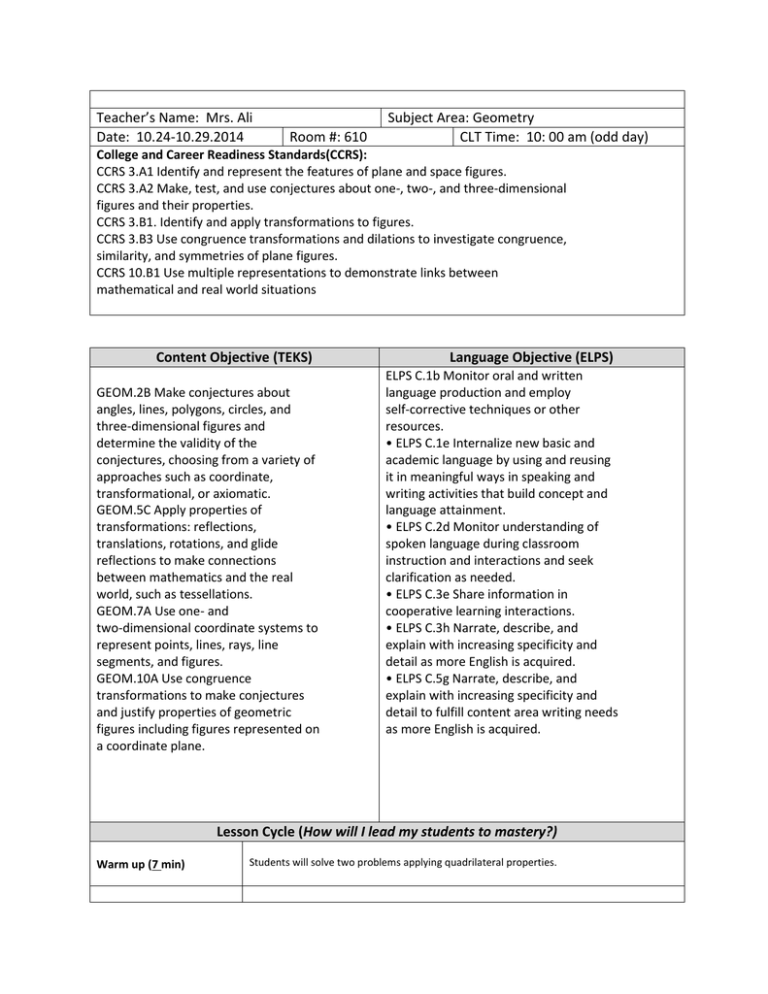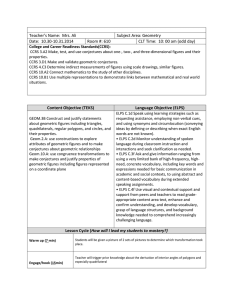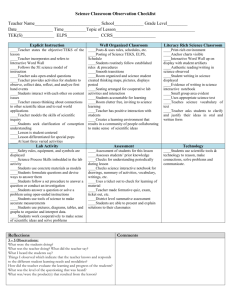Transformation
advertisement

Math Department Lesson Plan Template Teacher’s Name: Mrs. Ali Date: 10.24-10.29.2014 Room #: 610 Subject Area: Geometry CLT Time: 10: 00 am (odd day) College and Career Readiness Standards(CCRS): CCRS 3.A1 Identify and represent the features of plane and space figures. CCRS 3.A2 Make, test, and use conjectures about one-, two-, and three-dimensional figures and their properties. CCRS 3.B1. Identify and apply transformations to figures. CCRS 3.B3 Use congruence transformations and dilations to investigate congruence, similarity, and symmetries of plane figures. CCRS 10.B1 Use multiple representations to demonstrate links between mathematical and real world situations Content Objective (TEKS) GEOM.2B Make conjectures about angles, lines, polygons, circles, and three-dimensional figures and determine the validity of the conjectures, choosing from a variety of approaches such as coordinate, transformational, or axiomatic. GEOM.5C Apply properties of transformations: reflections, translations, rotations, and glide reflections to make connections between mathematics and the real world, such as tessellations. GEOM.7A Use one- and two-dimensional coordinate systems to represent points, lines, rays, line segments, and figures. GEOM.10A Use congruence transformations to make conjectures and justify properties of geometric figures including figures represented on a coordinate plane. Language Objective (ELPS) ELPS C.1b Monitor oral and written language production and employ self-corrective techniques or other resources. • ELPS C.1e Internalize new basic and academic language by using and reusing it in meaningful ways in speaking and writing activities that build concept and language attainment. • ELPS C.2d Monitor understanding of spoken language during classroom instruction and interactions and seek clarification as needed. • ELPS C.3e Share information in cooperative learning interactions. • ELPS C.3h Narrate, describe, and explain with increasing specificity and detail as more English is acquired. • ELPS C.5g Narrate, describe, and explain with increasing specificity and detail to fulfill content area writing needs as more English is acquired. Lesson Cycle (How will I lead my students to mastery?) Warm up (7 min) Students will solve two problems applying quadrilateral properties. Engage/hook (15min) Model (15min) Guided Practice (15min) Independent Practice The student will match reflection, rotation, dilation and translation with a visual representation of isometry transformations. The teacher will discuss image and preimage, how shapes stay congruent and ask students to describe a given isometry transformation. Teacher will model how to perform each transformation. The teacher will also introduce dilation and tessellation transformations. The teacher will use questions and cues to elicit prior knowledge of translation, discuss image and preimage. The teacher will instruct students to describe a given transformation and which type or (composition) occurred. (20 min) Students will complete a handout on transformations. Students will create a tessellation Summary of the lesson. Closure (10min) Exit Ticket (8min) Students will be given three transformations and be asked to determine whether each is a translation, rotation, or reflection. Notes: Transformations will cover 3 class periods

